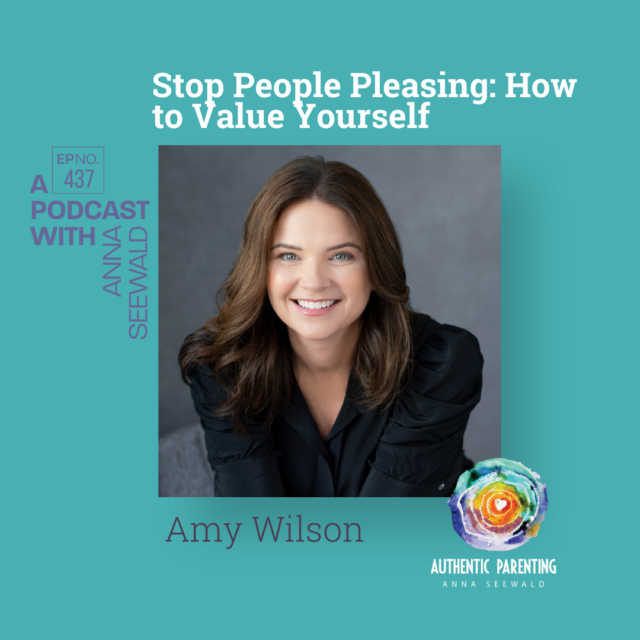We all want our children to be happy and successful, but are we inadvertently hindering their growth by overstepping our boundaries as parents? This week’s episode of the Authentic Parenting podcast, featuring author and podcaster Amy Wilson, delves into the delicate balance between providing support and fostering independence in our children.
The episode tackles a common parenting dilemma: when does helping become hovering? As parents, we’re often driven by a deep desire to protect our children from pain and disappointment. However, shielding them from every challenge can prevent them from developing crucial life skills like resilience, problem-solving, and self-reliance.
Here are some key insights from the episode to help you find that sweet spot between support and independence:
- Recognize the power of “Do you think you can handle this?” This simple question, asked after validating your child’s feelings, empowers them to take ownership of the situation while leaving space for them to seek your guidance if needed.
- Whose problem is it? Before jumping in to fix every issue, pause and ask yourself if it truly belongs to your child. Sometimes, the best support is simply listening with empathy and allowing them to navigate the situation independently.
- Resist the urge to be the happiness police. Our role is to equip our children with the tools to navigate life’s ups and downs, not to ensure their constant happiness.
- Be mindful of your own “helper” tendencies. Are you driven by genuine kindness or a need to control and fix? Recognizing your own patterns can help you set healthier boundaries and avoid overstepping.
Ultimately, raising resilient children requires a delicate dance between offering support and granting autonomy. By embracing the messy, uncertain nature of growth and allowing our children to learn from their experiences, we empower them to become capable, confident individuals.

Here are some key takeaways with timestamps:
- 0:00-5:15 Introduction Anna introduces Amy Wilson.
- 5:15-12:00 Helping vs. Hovering Amy and Anna discuss the challenges of finding the balance between supporting children and allowing them to experience necessary struggles. They explore the societal pressures placed upon mothers, particularly the contradictory expectations of being both overly involved and disengaged.
- 12:00-20:00 Letting Children Suffer This segment delves into the importance of permitting children to encounter difficulties as a means of developing resilience. They emphasize the significance of offering empathy and support without immediately intervening to solve every problem. Amy highlights the value of the question, “Do you think you can handle this?”, as a way to gauge a child’s need for assistance while encouraging self-reliance.
- 20:00-27:00 Whose Problem Is It? Anna introduces the discerning question, “Whose problem is this?” to determine when parental involvement is necessary. They acknowledge that while autonomy is crucial, there are instances requiring direct parental intervention, such as bullying or serious safety concerns.
- 27:00-34:00 The Value of Presence Amy and Anna emphasize the profound impact of simply being present and listening to children as they navigate challenges. They stress that holding space and offering empathy are valuable forms of support, often surpassing the perceived need for immediate solutions.
- 34:00-41:00 Meeting Needs vs. Making Happy They differentiate between meeting a child’s needs and striving to make them happy. Meeting needs, both emotional and physical, is a parental responsibility, while happiness is a subjective experience that should not be a primary focus.
- 41:00-48:00 The Impact of Parental Wounds Anna and Amy discuss how unresolved issues from their own childhoods can influence their parenting styles, particularly in their tendency to over-help. Amy reflects on her upbringing in a large family where helpfulness was highly valued and how this impacted her approach to assisting others.
- 48:00-55:00 The Challenge of Receiving Help Amy addresses the difficulties women face in receiving help, particularly the societal tendency to attribute their struggles to personal flaws like perfectionism rather than systemic inequalities. She advocates for women to redistribute workloads and challenge the notion that they must constantly prioritize others’ needs.
- 55:00-1:02:00 Recognizing and Challenging Overhelping They discuss the importance of recognizing and challenging patterns of overhelping, both in parenting and personal relationships. Amy emphasizes that setting boundaries and allowing others to take responsibility can be more effective than consistently stepping in to solve problems.
- 1:02:00-1:09:00 The Karpman Drama Triangle Anna introduces The Drama Triangle, a model of communication that identifies three roles: victim, rescuer, and persecutor. They discuss how understanding this dynamic can provide insight into interpersonal interactions and help individuals break free from unhealthy patterns.
- 1:09:00-1:16:00 Parental Instincts and Uncertainty They explore the complexities of parental instincts, particularly in situations where a child is experiencing suffering or health challenges. Amy acknowledges the struggle between advocating for a child’s well-being and recognizing when excessive intervention might be detrimental. She underscores the importance of self-compassion when reflecting on past parenting decisions.
- 1:16:00-1:23:00 Embracing Uncertainty and Self-Kindness Amy and Anna conclude by emphasizing the necessity of embracing uncertainty and practicing self-compassion in parenting. They highlight the futility of striving for perfection and acknowledge that regrets and second-guessing are inevitable aspects of the journey. They encourage listeners to focus on being present, offering support, and accepting the inherent messiness of life.
- 1:23:00- End Conclusion Amy shares her contact information. She and Anna briefly discuss the distinction between “helper” and “people-pleaser,” with Anna sharing her preference for the term “self-abandonment” to describe the deeper implications of people-pleasing behavior.
This podcast episode offers valuable insights into the dynamics of helping and over-helping, particularly in the context of parent-child relationships. By recognizing the potential pitfalls of excessive intervention and the importance of fostering a child’s self-reliance, parents can cultivate a more balanced approach that empowers both themselves and their children.
